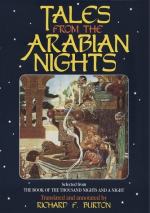Mirza Abu Talib “the Persian Prince"[FN#348] offers six reasons why “the liberty of the Asiatic women appears less than that of the Europeans,” ending with,
I’ll
fondly place on either eye
The
man that can to this reply.
He then lays down eight points in which the Moslem wife has greatly the advantage over her Christian sisterhood; and we may take his first as a specimen. Custom, not contrary to law, invests the Mohammedan mother with despotic government of the homestead, slaves, servants and children, especially the latter: she alone directs their early education, their choice of faith, their marriage and their establishment in life; and in case of divorce she takes the daughters, the sons going to the sire. She has also liberty to leave her home, not only for one or two nights, but for a week or a fortnight, without consulting her husband; and whilst she visits a strange household, the master and all males above fifteen are forbidden the Harem. But the main point in favour of the Moslem wife is her being a “legal sharer”: inheritance is secured to her by Koranic law; she must be dowered by the bridegroom to legalise marriage and all she gains is secured to her; whereas in England a “Married Woman’s Property Act” was completed only in 1882 after many centuries of the grossest abuses.
Lastly, Moslems and Easterns in general study and intelligently study the art and mystery of satisfying the physical woman. In my Foreword I have noticed among barbarians the system of “making men,"[FN#349] that is, of teaching lads first arrived at puberty the nice conduct of the instrumentum paratum plantandis avibus: a branch of the knowledge-tree which our modern education grossly neglects, thereby entailing untold miseries upon individuals, families and generations. The mock virtue, the most immodest modesty of England and of the United States in the xixth century, pronounces the subject foul and fulsome:"Society” sickens at all details; and hence it is said abroad that the English have the finest women in Europe and least know how to use them. Throughout the East such studies are aided by a long series of volumes, many of them written by learned physiologists, by men of social standing and by religious dignitaries high in office. The Egyptians especially delight in aphrodisiac literature treating, as the Turks say, de la partie au-dessous de la taille; and from fifteen hundred to two thousand copies of a new work, usually lithographed in cheap form, readily sell off.




